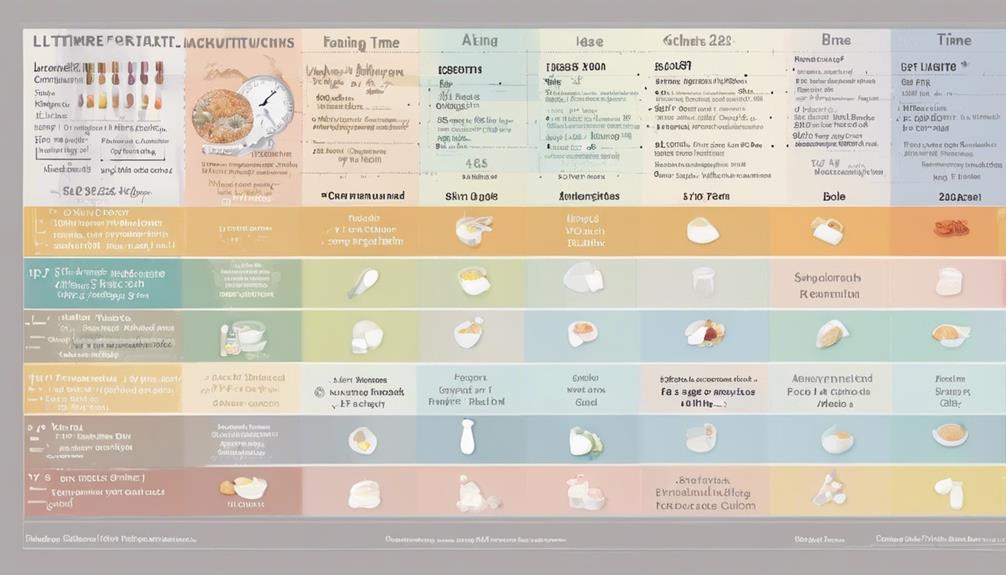When feeding your newborn, you might be tempted to question, “Cold formula? Seriously?” However, don’t dismiss it just yet! While babies typically prefer their milk warm, there are benefits to trying the chilled option.
Interested in learning more about how to safely navigate this feeding choice for your little one?
Key Takeaways
- Cold formula can be stored for 24 hours in the fridge.
- Safely handle and prepare formula with boiled water.
- Monitor baby's cues and adjust feeding method for comfort.
- Follow expert recommendations from pediatricians for feeding cold formula.

Termichy Stackable Formula Dispenser Portable Milk Powder Container, 2 Pack, Warm Grey
Independent Spout and Stackable Design: Each compartment of the formula dispenser is equipped with independent funnel, they can…
As an affiliate, we earn on qualifying purchases.
As an affiliate, we earn on qualifying purchases.
Cold Formula Storage Guidelines
When storing cold formula, it's important to follow specific guidelines to guarantee its safety and freshness for your newborn. Cold formula can be stored in the refrigerator for up to 24 hours after preparation. It's crucial to promptly refrigerate any unused mixed formula to prevent bacterial growth and maintain its integrity.
Additionally, formula powder should be stored in a cool, dark place to preserve its freshness. Dispose of any excess formula after 24 hours to ensure your baby's safety and the quality of the formula. Proper storage is key to ensuring that the cold formula remains safe for consumption.

Babba Baby Bottle Cooler and Warmer – Both refrigerates and Fast Warming, Breast Milk Storage, Travel-Friendly and Portable, Smart app-Control, Perfect Temperature
Ultimate Convenience: Easily feed your baby whether at home or on-the-go. Cold milk with a press of a…
As an affiliate, we earn on qualifying purchases.
As an affiliate, we earn on qualifying purchases.
Safe Handling Practices

To guarantee the safety and well-being of your newborn, it's essential to practice safe handling techniques when preparing and serving cold formula. When dealing with your baby's nutrition, following proper guidelines is important for their health and development. Here are some key practices to keep in mind:
- Store mixed formula in the fridge: After preparing cold formula, make sure it's stored in the refrigerator promptly. This helps maintain freshness and prevents harmful bacteria from growing.
- Use boiled and cooled water: When preparing cold formula, always use boiled and cooled water. This step is crucial in eliminating any potential harmful bacteria that could be present.
- Test the temperature before feeding: Before offering the cold formula to your baby, make sure to test the temperature on your wrist. This simple action helps prevent any burns or discomfort during feeding time.

Yacumama Digital Water Thermometer for Liquid, Candle, Instant Read with Waterproof for Food, Meat, Milk, Long Probe
WATERPROOF – IPX7 waterproof. No worry on the rinse or wash under running water after measuring, easy clean…
As an affiliate, we earn on qualifying purchases.
As an affiliate, we earn on qualifying purchases.
Risks of Cold Formula
Cold formula poses potential risks to newborns, especially those with delicate digestive systems. Babies, particularly premature infants or those with slow weight gain, may experience discomfort when given cold formula. The risk of bacterial growth also increases when formula is stored cold.
Premature babies, known for their sensitive digestive systems, may not tolerate cold formula well, making it uncertain whether it's safe for them. When babies dislike cold formula, they might refuse to feed, leading to crying and disruptions in feeding routines.
It's essential to take into account these factors before offering cold formula to guarantee the baby's well-being and comfort. In the next section, we'll explore the best practices for feeding newborns cold formula safely to help caregivers navigate this aspect of infant care with confidence and knowledge.

Dr. Brown's Baby Formula Dispenser with Snap-On Lid for On-the-Go Feedings,Milk Powder Dispenser for Traveling with Infant,Gray
PORTABLE FORMULA CONTAINER. Compact and travel-friendly making it easy to bring pre-measured servings of formula wherever you and…
As an affiliate, we earn on qualifying purchases.
As an affiliate, we earn on qualifying purchases.
Best Practices for Feeding

Considering the potential risks associated with cold formula, understanding and implementing best practices for feeding newborns is important for ensuring their well-being and comfort. When it comes to feeding your baby, here are some essential tips to keep in mind:
- Observe the Baby's Cues: Pay attention to your baby's signals during feeding time. Adjust the feeding method accordingly to make sure they're comfortable and content.
- Use a Baby Bottle: Select a suitable baby bottle that's easy for your little one to latch onto and promotes proper feeding techniques.
- Provide Essential Nutrients: Make sure that the formula you choose, whether cold or warm, contains all the essential nutrients required for your baby's healthy growth and development.
Expert Recommendations
Experts in the field of pediatrics universally recommend feeding newborns cold formula as a safe and beneficial option for their nourishment. Pediatricians support cold formula due to its importance and the benefits it offers. Both the American Academy of Pediatrics and the World Health Organization consider cold formula safe for babies.
There's no medical evidence showing negative effects of cold milk on infants. Proper storage and handling practices are essential for safely serving cold formula to your baby. Cold formula retains more nutrients compared to overheated formula, making it a suitable option for feeding your newborn.
Frequently Asked Questions
Is It OK to Give Newborns Cold Formula?
Yes, it's okay to give newborns cold formula. Starting with slightly warmed formula may be preferred at first, especially for premature babies. Baby cues and comfort should guide the change to cold formula. Always prioritize their needs.
Can Cold Formula Upset Baby's Stomach?
Yes, cold formula can upset a baby's stomach, especially if they have specific health concerns. It's important to monitor for any signs of discomfort and consult with a pediatrician promptly. Our baby's well-being is our top priority.
What Happens if I Accidentally Give My Newborn Cold Formula?
Mistakenly offering cold formula to a newborn is typically harmless. Our little ones can usually handle it well. If they show signs of disliking it, warm formula might be more appealing. Always seek guidance from a pediatrician for personalized advice.
What Happens if Baby Drinks Formula After 2 Hours?
If baby drinks formula after 2 hours, it risks bacterial contamination. It's vital to discard any formula left out too long to safeguard their health. Always prioritize proper storage and timing to protect your precious little one.
Conclusion
So remember, when it comes to feeding your newborn cold formula, just think of it as a invigorating beverage for your little one. Keep those bottles chilled in the fridge, handle them with care, and always test the temperature before serving.
Your baby will thank you for the cool treat, and you can relax knowing you're following the expert recommendations. Cheers to safe and satisfying feedings!









